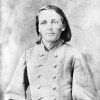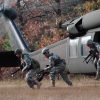calsfoundation@cals.org
Skirmish at Eudora Church
| Location: | Chicot County |
| Campaign: | None |
| Date: | May 9, 1864 |
| Principal Commanders: | Captain E. G. Hughes (US); Unknown (CS) |
| Forces Engaged: | 1 company of the Mississippi Marine Brigade (US); Small squad of irregulars (CS) |
| Estimated Casualties: | None (US); Unknown (CS) |
| Result: | Union victory |
Conflict along the Mississippi River did not end with the Confederate defeat at the July 1863 Battle of Helena. Throughout 1864, Confederate forces attempted to harass Federal shipping from the Arkansas side of the river. The Skirmish at Eudora Church resulted from Federal efforts to stop this harassment.
The forces engaged were small in number and irregular in nature. The Confederates fielded only a squad (a party smaller than a company), and Confederate forces operating in this area were described as “independent squads, deserters, skulkers fleeing from conscription” and “lawless bands.” On the Federal side, one infantry company of the Mississippi Marine Brigade fought at Eudora Church. This brigade was created to protect Federal shipping from Confederate attacks along rivers.
On May 7, 1864, four infantry companies of the brigade crossed Bayou Mason and explored the side of the bayou opposite from the Mississippi River; these companies were mounted on horses. Eight miles after crossing, the command divided, with two companies proceeding farther inland. This detachment dispersed a Confederate guard post and then raided a Confederate supply station, capturing the supplies and two guards. After loading up the captured supplies, the detachment returned without incident.
Two days later, Captain E. G. Hughes returned to the area with two of the brigade’s mounted infantry companies, C and F, intent on searching the vicinity of the supply station. After crossing the bayou, the detachment split, with each company taking a separate route away from the bayou. Captain Hughes accompanied a small advance guard preceding Company F. Two historians of the Mississippi Marine Brigade set the scene: “[T]hey ascended a little rise of ground upon which, in the midst of some trees, stood a church building,” which was the Eudora Church.
As the Federal advance guard approached the church, a concealed squad of Confederates rushed from their cover and demanded that the advanced guard surrender. With a distance of over fifty yards between the advance guard and the Confederate squad, the advance guard’s leader “denounced them with an oath” and the guard then “immediately wheeled and galloped to the rear.” The Confederates chased them with a volley of gunfire, without causing loss to the retreating Federals.
Captain Hughes deployed Company F and returned the Confederates’ fire. The squad promptly disappeared. Fearing that this squad was part of a larger Confederate force, Captain Hughes withdrew Company F in the direction taken by Company C. Hearing the gunfire, Company C had already moved toward the skirmish, and the two companies quickly reunited. The detachment returned to Bayou Mason and called for reinforcements. A few hours later, two more companies and a howitzer arrived. The Federals proceeded to the Eudora Church area to search for Confederates, without success. The four companies returned to the Mississippi River early that evening.
But the Confederates were still in the area. The next day, the Mississippi Marine Brigade learned that the Confederates had destroyed the raft used by the brigade to cross Bayou Mason. Shortly after, larger forces would engage in the Engagement at Old River Lake on June 6, 1864. Southeastern Arkansas would continue to see operations such as the one involving the Skirmish at Eudora Church.
For additional information:
Crandall, Warren D., and Newell I. Denison. History of the Ram Fleet and the Mississippi Marine Brigade. St. Louis: Buschart Brothers, 1907.
Hearn, Chester G. Ellet’s Brigade: The Strangest Outfit of All. Baton Rouge: Louisiana State University Press, 2000.
Simons, Don R. In Their Words: A Chronology of the Civil War in Chicot County, Arkansas and Adjacent Waters of the Mississippi River. 2nd ed. Sulphur, LA: Wise Publications, 2000.
Frank Arey
Little Rock, Arkansas
 Civil War Timeline
Civil War Timeline Jayhawkers and Bushwhackers
Jayhawkers and Bushwhackers Military
Military



Comments
No comments on this entry yet.